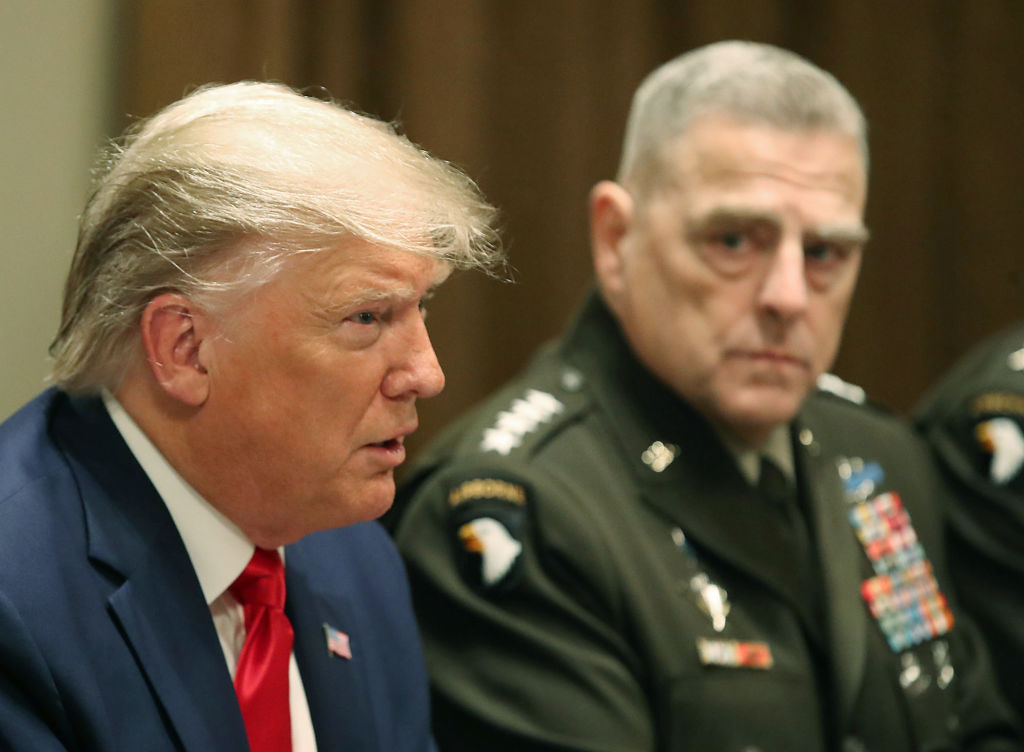In this mailing:
- Con Coughlin: Iran fills the Vacuum Created by Trump's Withdrawal
- Lawrence A. Franklin: Is NATO Still Vital?
- Cannabis and Driving: How Safe Are You?
by Con Coughlin • December 12, 2019 at 5:00 am
President Trump has hastened the withdrawal of American forces from Syria, and is actively seeking to reduce America's military presence elsewhere in the region, with troop withdrawals under active consideration in countries such as Iraq and Afghanistan.
"Russia is always on standby to fill power voids. That is how it happened that Russian troops swept in when the US left northern Syria. To sum up that still unfolding story: nobody will remember it as our finest hour.... There are some deeply malign forces at work in the broader Middle East... disengagement is just another term for leaving all the power to them." – Richard Cheney, Former US Vice President," Arab Strategy Forum, Dubai.
It is a measure of the failure of the nuclear deal with Iran that former US President Barack Obama helped to negotiate in 2015 that Tehran used the brief easing of tensions with Washington to strengthen and consolidate its military presence in Arab countries such as Syria, Lebanon and Iraq.
There are now serious concerns that Mr Trump's desire to reduce America's military presence in the Middle East will only encourage Iran to intensify its own activity, thereby increasing the threat to Israel and pro-Western Arab states.
The problem for small states such as Lebanon, though, is that they are no match for a regional superpower like Iran. And so long as the mullahs have the resources and weaponry to maintain their aggressive presence in the region, there is very little that small states like Lebanon can do to stop them.

President Donald Trump has made no secret of his dislike of America's long-standing military involvement in the Middle East, which dates back decades, and which he claims has cost the American taxpayer a mind-blowing $8 trillion. Pictured: President Trump speaks about his decision to pull U.S troops out of northeastern Syria, as Joint Chiefs of Staff Chairman, Army Gen. Mark Milley, looks on, October 7, 2019. (Photo by Mark Wilson/Getty Images)
The threat by a senior commander in Iran's Islamic Revolutionary Guard Corps this week "to flatten Tel Aviv" from Iranian-controlled bases in southern Lebanon provides arguably the most graphic example of the deepening dangers the region faces as a result of the Trump administration's decision to scale down its military presence.
With next year's presidential election contest now very much the primary focus of President Donald J. Trump's attention, many of America's long-standing allies in the Middle East are becoming increasingly concerned at the president's desire to improve his electoral prospects by scaling down America's military footprint.
by Lawrence A. Franklin • December 12, 2019 at 4:30 am
Many additional countries who joined the alliance -- such as Poland, Hungary and the Baltic States, which had been Soviet satellites -- still consider post-Communist Russia an extremely disquieting potential threat. That is just one issue that has created friction among NATO nations....
The larger question [is] the degree to which enemy countries perceive NATO as a unified organization that would respond militarily to aggression against any member state -- a crucial psychological factor in deterrence.
Its reason for being should not be written off quite yet...

In the absence of cohesion and deterrence, NATO no longer would be viable or vital. But its reason for being should not be written off quite yet. Pictured: A group photo of the NATO leaders, taken on December 4, 2019 in Watford, England, at the NATO summit. (Photo by Steve Parsons - WPA Pool/Getty Images)
The two-day summit of the North Atlantic Treaty Organization (NATO) -- held in London on December 3-4 to commemorate its 70th anniversary -- may have been marked by controversy, but the gathering constituted an important reminder of why the international alliance was established in the first place.
Founded in April 1949 by the United States, Canada, Belgium, Denmark, France, Iceland, Italy, Luxembourg, the Netherlands, Norway, Portugal and the United Kingdom, NATO was a pact created to counter the world's greatest threat at the time: the Soviet Union and its race for global domination.
At the time, it was clear that all NATO members were dependent on and deferred to American political and military leadership. Since the collapse of the Soviet Union, however, some of the original NATO member states began to seek systems that would protect their particular individual interests.
December 12, 2019 at 4:00 am
Gatestone's 2020 Conference on the Effects of Marijuana. Details coming soon.

(Image source: iStock)
Gatestone's 2020 Conference on the Effects of Marijuana. Details coming soon.
by Alan M. Dershowitz • December 11, 2019 at 2:00 pm
These two grounds [of impeachment] — abuse of power and obstruction of congress — are not among the criteria specified for impeachment. Neither one is a high crime and misdemeanor. Neither is mentioned in the constitution. Both are the sort of vague, open-ended criteria rejected by the framers. They were rejected precisely to avoid the situation in which our nation currently finds itself.
So, what options would the senate have if the House voted to impeach on two unconstitutional grounds? Would it be required to conduct a trial based on "void" articles of impeachment? Could it simply refuse to consider unconstitutional articles? Could the president's lawyer make a motion to the Chief Justice — who presides over the trial of an impeached president — to dismiss the articles of impeachment on constitutional grounds?
Regardless of the outcome, the damage will have been done by the House majority that will have abused its power by weaponizing the House's authority over impeachment for partisan purposes — exactly as Hamilton feared.

Pictured: Speaker of the House Rep. Nancy Pelosi speaks on December 10, 2019 in Washington, DC at a news conference, in which House Democrats announced two articles for the next steps in the House impeachment inquiry against President Donald Trump. (Photo by Alex Wong/Getty Images)
If the House of Representatives were to impeach President Trump on the two grounds now before it, the senate would be presented with a constitutional dilemma. These two grounds— abuse of power and obstruction of Congress— are not among the criteria specified for impeachment. Neither one is a high crime and misdemeanor. Neither is mentioned in the constitution. Both are the sort of vague, open-ended criteria rejected by the framers. They were rejected precisely to avoid the situation in which our nation currently finds itself. Abuse of power can be charged against virtually every controversial president by the opposing party. And obstruction of Congress — whatever else it may mean — cannot extend to a president invoking privileges and then leave it to the courts to referee conflicts between the legislative and executive branches.
|
|
|
|
No comments:
Post a Comment